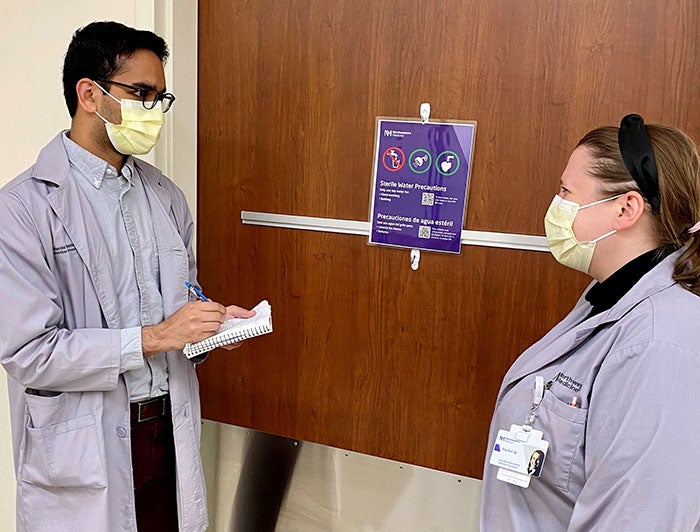Northwestern Memorial Hospital: Multidisciplinary Team Leads Practice Change to Prevent Infections

In 2021, the Infection Prevention and Transplant Infectious Diseases teams at Northwestern Memorial Hospital in Chicago observed a significant increase in the number of pulmonary infections caused by Mycobaterium abscessus. These infections had primarily occurred in the cardiothoracic transplant population. M. abscessus is difficult to eliminate in water systems, inherently resistant to several antibiotics and can cause pulmonary infections — with treatments spanning months or even years — in immunocompromised patients.
To address this outbreak, the hospital rolled out a sterile water precautions initiative in two phases — March and June 2022. Rollout occurred after a surge of the omicron variant of the coronavirus at the hospital in winter 2021. A multidisciplinary team was created and led the effective implementation of this significant practice change.
In the initial outbreak investigation stage, the multidisciplinary team involved infection prevention, transplant infectious diseases, microbiology laboratory, allied health (including respiratory therapy, speech-language pathology, nutrition, and physical and occupational therapy) and nurses from some of the inpatient units that cared for heart and lung transplant patients. After transitioning into the outbreak mitigation planning stage, the team expanded to include transplant coordinators and more nurses, advanced practice providers and physician representatives from cardiac surgery, thoracic surgery, transplant pulmonology, cardiology, pulmonary critical care and anesthesia critical care.
The outbreak investigation paved the way for determining what mitigation strategy to use. Implementing and operationalizing a significant practice change requires extensive input and expertise, which is why the multidisciplinary team was so large and comprehensive. Looping in all the different teams helped identify key points to address. These points included:
- post-discharge education;
- an IT solution — i.e., how to identify who needs the sterile water precautions;
- signage to post on the doors of patient rooms and also inside rooms;
- staff, patient and visitor education;
- a plan to monitor the supply of sterile water; and
- input on frequently asked questions that were included in the education plan for a smooth and efficient rollout.
The Northwestern Memorial Hospital team modeled its practice of sterile water precautions after Duke Health’s experience, which had been published in a scientific journal. By eliminating tap water use after developing a sterile water protocol, the Duke team had significantly reduced cases of M. abscessus at their organization.
As a result of this initiative, Northwestern Memorial Hospital reported zero cases of M. abscessus for a year. Next steps include continued monitoring of cases since implementation of the sterile water precautions.
Key Takeaways
Targeted Problem: Pulmonary infections caused by M. abscessus
Interventions Used:
- Conducted an outbreak investigation.
- Expanded the team to even more departments and disciplines.
- Rolled out a sterile water precautions initiative.
- Educated staff, patients and visitors on the practice change, and invited their input on FAQs about the education plan.
- Developed an IT solution to identify who needs sterile water precautions.
- Created signage both inside and on the doors of patient rooms.
Impact: Eliminated cases of M. abscessus for one year, and significantly reduced the number of overall pulmonary infections.

